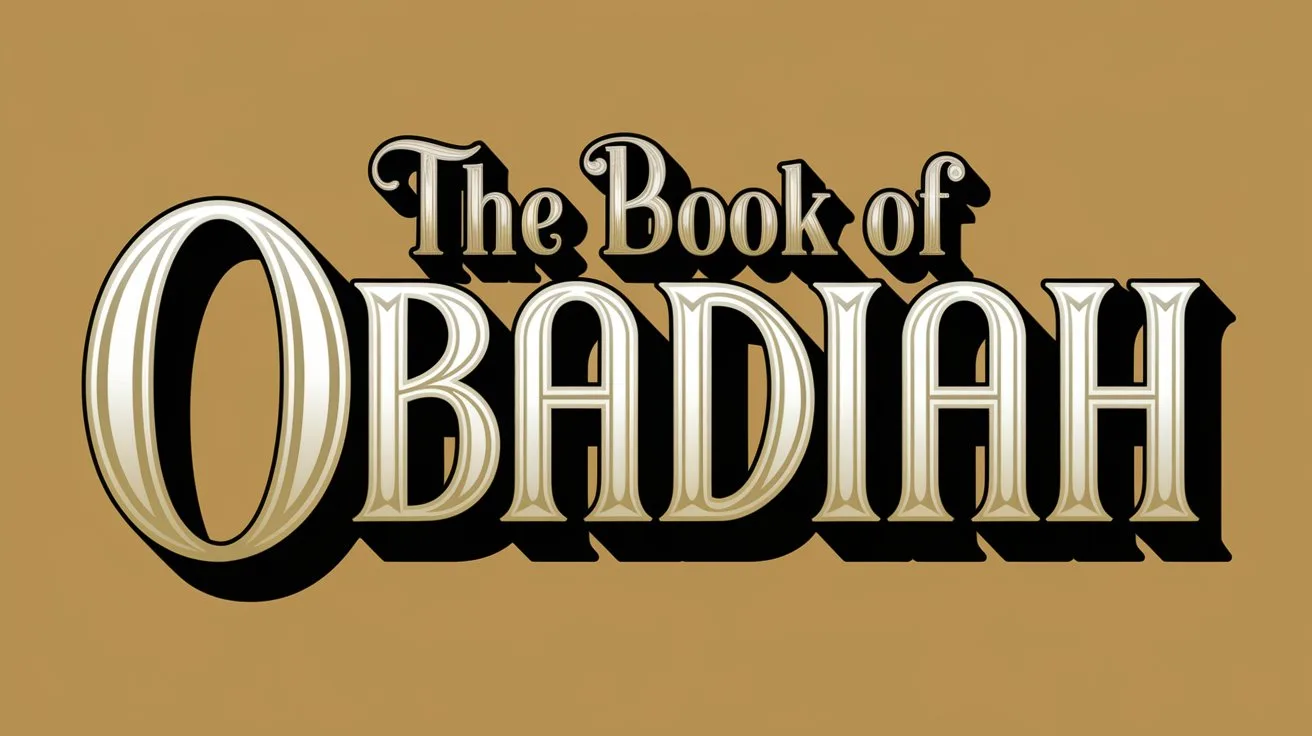The book of Obadiah is the shortest book in the Old Testament, consisting of only 21 verses. Despite its brevity, it delivers a powerful message of judgment against Edom and a prophecy of Israel’s restoration.
Who Was Obadiah?
Obadiah is one of the minor prophets, but very little is known about him personally. His name means “Servant of Jehovah” or “Worshiper of Jehovah”. Unlike other prophets, there is no mention of his family, his hometown, or even the specific time in which he lived.
However, based on the events described in his prophecy, most scholars place Obadiah’s ministry around 586 B.C., shortly after the destruction of Jerusalem by Babylon. Some argue for an earlier date; but the book’s focus on Edom’s betrayal of Israel strongly suggests it was written in response to the Babylonian invasion.
The Message of the Book
The book of Obadiah is primarily a prophecy against Edom, the descendants of Esau, who were bitter enemies of Israel. The Edomites not only refused to help Israel in their times of need but actively worked against them when Jerusalem was attacked. Because of this, God declared severe judgment upon Edom.
The book can be divided into three main sections:
The Judgment of Edom (Verses 1-14)
Obadiah begins by declaring that Edom’s pride will lead to its downfall:
“The pride of your heart has deceived you,
You who dwell in the clefts of the rock,
Whose habitation is high;
You who say in your heart, ‘Who will bring me down to the ground?’” (Obadiah 1:3)
Edom was known for its fortified cities built into the mountains, particularly Petra, which seemed impenetrable. However, God makes it clear that no amount of human security can protect them from His judgment:
“Though you ascend as high as the eagle,
And though you set your nest among the stars,
From there I will bring you down,” says the Lord.” (Obadiah 1:4)
The reason for Edom’s destruction was their violence and betrayal against Israel. When Babylon invaded Jerusalem, the Edomites took advantage of the situation by looting, killing, and even capturing escaping Israelites to hand them over to their enemies:
“You should not have stood at the crossroads
To cut off those among them who escaped;
Nor should you have delivered up those among them
who remained in the day of distress.” (Obadiah 1:14)
Edom’s actions showed their hatred for Israel, even though they were descendants of Esau, the brother of Jacob. This family feud, which began in Genesis 25, had now led to divine judgment.
The Day of the Lord (Verses 15-18)
Obadiah transitions from Edom’s judgment to the broader “Day of the Lord,” which is a time of judgment for all nations:
“For the day of the Lord upon all the nations is near;
As you have done, it shall be done to you;
Your reprisal shall return upon your own head.” (Obadiah 1:15)
This passage reveals a key biblical principle: what goes around comes around. Edom had betrayed Israel, so God would bring the same destruction upon them. God also declares that Israel will be restored, while Edom will be completely wiped out:
“But on Mount Zion there shall be deliverance,
And there shall be holiness;
The house of Jacob shall possess their possessions.
The house of Jacob shall be a fire,
And the house of Joseph a flame;
But the house of Esau shall be stubble;
They shall kindle them and devour them,
And no survivor shall remain of the house of Esau,”
For the Lord has spoken.” (Obadiah 1:17-18)
This prophecy was fulfilled in history. Edom was eventually destroyed as a nation and ceased to exist. By the time of Christ, the Edomites (Idumeans) were absorbed into other cultures, and after the destruction of Jerusalem in 70 A.D., they disappeared from history.
The Restoration of Israel (Verses 19-21)
The final section of Obadiah speaks of Israel’s future restoration and dominance over their enemies:
“Then saviors shall come to Mount Zion
To judge the mountains of Esau,
And the kingdom shall be the Lord’s.” (Obadiah 1:21)
While this prophecy had a partial fulfillment in the past, it also points to the future Millennial Kingdom, where Jesus Christ will reign and Israel will be fully restored.
The Purpose and Place of Obadiah in Scripture
Obadiah serves several key purposes in the Bible:
A Warning Against Pride and Betrayal : Edom’s downfall was rooted in pride and treachery. The Bible consistently warns that pride leads to destruction (Proverbs 16:18).
God’s Justice : The book of Obadiah reminds us that God sees every injustice and will bring judgment in His time. Edom thought they had escaped punishment, but God’s judgment came when they least expected it.
The Faithfulness of God to Israel: Despite their suffering, Israel’s story does not end in destruction. Obadiah prophesies that God will restore them and fulfill His promises.
A Prophetic Picture of the End Times: The themes of the Day of the Lord, judgment of the nations, and Israel’s ultimate restoration all point to the second coming of Christ, where He will establish His kingdom.
My Final Thoughts
Though short in length, the book of Obadiah is rich in meaning. It serves as a powerful reminder that God is sovereign over the nations, that pride leads to destruction, and that God’s people will ultimately be vindicated. The story of Edom is a warning that those who oppose God and His people will not escape judgment.
On the other hand, for believers, the hope of restoration remains. Just as Israel was promised deliverance, we too have the assurance that God will fulfill His promises to us through Jesus Christ.
“For the kingdom is the Lord’s,
And He rules over the nations.” (Psalm 22:28)





 Get the book that teaches you how to evangelize and disarm doctrines from every single major cult group today.
Get the book that teaches you how to evangelize and disarm doctrines from every single major cult group today.